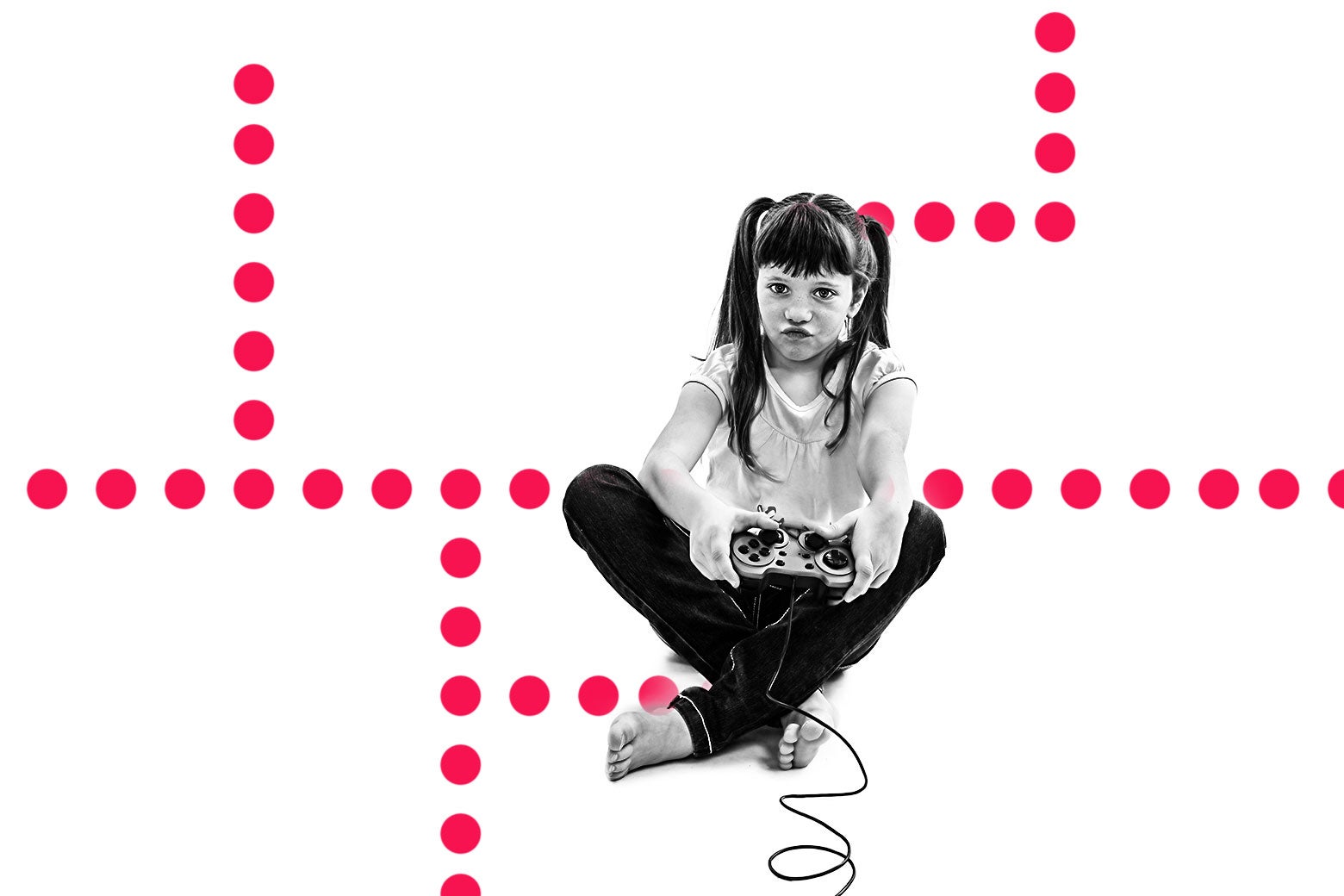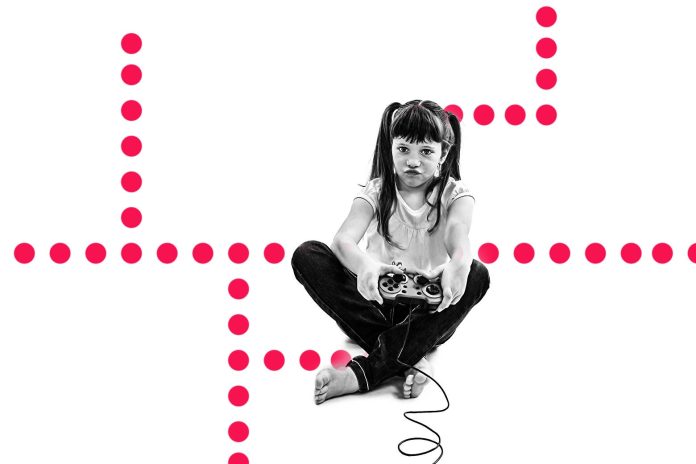
Our advice columnists have heard it all over the years—so we’re diving into the Dear Prudence archives to share classic letters with our readers.Submit your own questions to Prudie here.
Dear Prudence,
I work for an indie video game studio that makes games aimed at young adults. Our company values itself on being progressive, especially when it comes to content having to do with gender and inclusivity. I generally love my job—there’s a lot of writing involved, and everyone seems on board with the message of tolerance and empowerment that I’m trying to communicate through our stories.
But at lunch recently, my boss was telling me about his young daughter’s troubles with making friends at school. She is interested in sci-fi and video games, and she’s frustrated that the girls in her year are only interested in “girl things.” My boss didn’t follow up with “And so I reminded her that video games are ‘girl things’ too” or “Let’s try to not think of activities in terms of gender.” He sort of dropped the story there with a shrug of the shoulders. In other words, he seemed to imply that he was on the same page as his 10-year-old daughter, as if to say, “Yeah, it does suck that you like video games and girls your age are only interested in girl things!”
It’s been a couple days now, and I’m kicking myself for not gently asking him if he agreed with what she said or if he planned to talk to her about mindsets toward gendered hobbies at any point. I also know that it’s really not my place to do that! I’m an employee of his, and it would likely be crossing a line to grill him on his parenting. With that said, we’re a very small team, and we’re generally pretty friendly and casual with each other; we know quite a bit about each other’s home lives, and he’s asked some fairly personal questions of me before. Where’s the line here? I hate to think that the figure at the helm of our nice, liberal studio is harboring some crappy ideas about the very people we’re crafting stories for.
—Should I Tell my Boss How to Be a Better Parent to his Daughter?
Dear Parent,
I think if your boss has asked you some ”fairly personal questions” before, the most important thing to do going forward is to clarify when you’re not comfortable answering personal questions so that he stops asking you, not to try to go over his parenting strategies with him again. That said, I understand why that moment stood out to you, especially given that it was directly related to the kind of work that you do. I think there would have been room in the moment to mildly push back, like, “Oh, I liked video games as a kid, and I hope she can find other girls who want to play too,” or mentioning that your target audience at least includes girls who like video games. But if that was a one-off remark and he’s otherwise a fairly thoughtful boss, I don’t think you have to worry he secretly thinks all girls except for his daughter only care about “girl things.”
—Danny M. Lavery
From: Help! My Fiancé’s Ex Is Our Neediest Wedding Guest. (From Oct. 07, 2019).
Dear Prudence,
My friends are all huggers. They often hug to say hello, and they always hug to say goodbye. I have agreed to hug them, because clearly they prefer it. But I don’t! I prefer to shake hands. (I lived in France for a while, where that’s much more normal.) Question is: How do I transition my friends-who-are-used-to-hugging to friends-who-understand-me-and-shake-my-hand instead? I’m looking for ways to phrase the request as well as what environments to express it in (in person, over social media, etc.). I still like my friends plenty, but I would like to find a way to communicate this more clearly. (And yes, I’ve seen Seinfeld’s “The Kiss Hello” many times!)
—Handshakes Not Hugs, Please
Dear Handshakes,
I think this is a conversation best conducted in person, assuming all of your friends are generally trustworthy and well-meaning people who won’t take “I don’t like hugging” as a dare to start trying to test that statement with a lot of extra hugs. But you don’t need much in the way of a script, I don’t think, unless you’re worried they’ll think it’s odd you haven’t mentioned it before: “I realize it may sound odd coming after so many years of knowing each other, but I really don’t like to hug, even with my closest friends. It’d make me feel more comfortable if we could shake hands instead—would you be willing to switch?” You can certainly substitute “I’m going to stop hugging, and I just wanted to make sure you know it doesn’t mean I’m upset or unhappy to see you” for “Would you be willing to switch?” if that strikes you as unnecessarily tentative. (I haven’t seen Seinfeld’s “The Kiss Hello,” but I’ll take your word for it that it wasn’t helpful for your situation. Good luck! It’s a perfectly reasonable request!)
—D. M. L.
From: Help! My Sister’s Fiancée Has a Fake Service Dog. (Sept. 30, 2019).
Dear Prudence,
My friend and her partner came into many millions a few years ago. I’m happy for them and have never (and would never) ask for anything, but she has been very generous over the years. Here’s the thing: She’s extremely negative. When we connect in person, there is always something said about events from our shared past, specifically our past former employer (we haven’t worked there in a decade). Most recently, she speculated about one of our former colleagues and why he’s still at the company, even though he could’ve jumped ship and joined her company and been a millionaire today.
I know this probably sounds mild, but I’m tired of her negatively rehashing the past, and I really think she should move on. I don’t want to speculate on what’s going on with her, but I imagine she feels a measure of guilt (and possibly isolation) due to her new financial—and, by extension, social—status. She’s definitely referred to having “survivor‘s guilt.” Thankfully, we are both working with qualified therapists, and I imagine she discusses this with hers. Is there a way I can tell her she can feel free to share feelings that may come up around her newfound wealth? How can I respectfully and lovingly tell her her negative comments are turning me off?
—Newly Rich Friend Has Become Negative
Dear Friend,
I’m not sure that you do need to bring her status as a millionaire into this. Even if she weren’t one, it would still be exhausting to hear her complain about former co-workers she hasn’t seen since 2009 on a regular basis. A sense of “survivor’s guilt” might play into this, or it might not, but you can really leave the speculation about what’s underpinning this behavior to her (and her qualified therapist). All you have to do is bring the behavior to her attention: “I don’t know if you’ve noticed this, but every time we get together you bring up our old employer to complain about things that happened 10 years ago, and it’s getting pretty exhausting. I don’t want to talk about this with you anymore. I’d appreciate it if you could stop bringing it up so we could find other things to talk about.”
—D. M. L.
From: Help! Is There a Nice Way to Tell My Husband He’s Racist? (Dec. 23, 2019).
More Classic Prudie
If I get one more person who takes out a cellphone in the middle of conversation, I may lose my religion. The final straw was when a daughter of a friend asked me for professional advice, and as soon as I started addressing her concern, she took out her phone and started responding to a text. I stopped talking immediately, and it took her a full 15 seconds to realize that I was waiting for her to finish her text. Finally, she looked up and said, “I’m listening.” No, young friend, you are not.
Don’t miss what’s new from Prudie
Get advice on manners and morals in your inbox three times a week.
